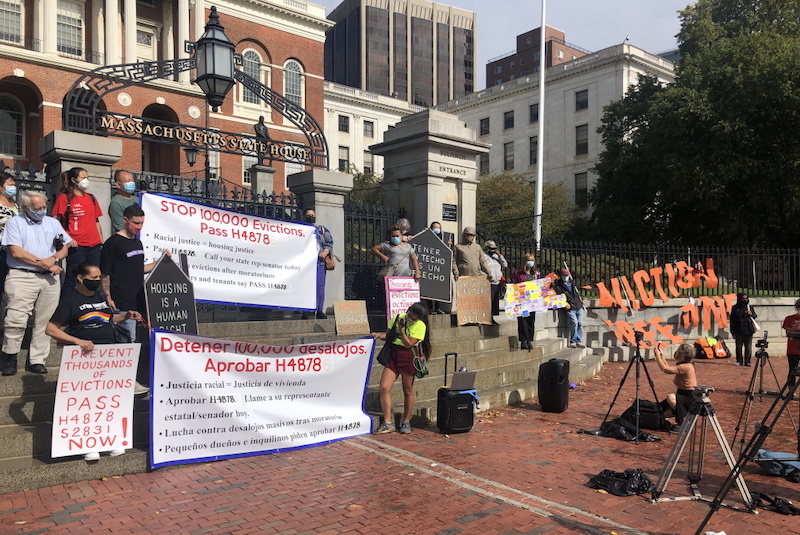latest
Massachusetts legislators push to extend eviction moratorium to Jun, 2022

By Chris Lisinski
Warning that the existing federal moratorium is tenuous and confusing, Sen. Patricia Jehlen urged her colleagues on Thursday to revive a state-level temporary ban on evictions and foreclosures despite opposition from property owners and landlords who argue it would exacerbate an already-strained market.
The U.S. Centers for Disease Control stood up a new eviction moratorium order last week, several days after its prior policy lapsed, that will last through Oct. 3 and applies to counties experiencing substantial and high levels of COVID-19 transmission.
Because of that end date and the limited coverage, Jehlen and fellow supporters of her bill (H 1434 / S 891) said they believe Massachusetts elected officials must provide a stronger safety net for the tens of thousands of residents facing housing insecurity.
“The current situation is very confusing. The federal moratorium on evictions does not apply to foreclosures, and it is hard to understand,” Jehlen told the Housing Committee at a hearing on her legislation. “This would create a more understandable and comprehensive set of solutions.”
The bill, filed in the House by Rep. Frank Moran and former Housing Committee Co-chair Rep. Kevin Honan, would restore a temporary ban on evictions and foreclosures for the 12 months after the end of the COVID-19 state of emergency. Gov. Charlie Baker lifted the state of emergency on June 15.
Other sections of the bill would also require landlords to seek rental assistance and cooperate with administering agencies before they turn to evictions and require the administration to streamline and simplify the application process for rental aid.
Real estate industry leaders and landlords lined up in opposition to the proposed moratorium revival, arguing that the hundreds of millions of dollars that remain available in rental aid prevent any need for the temporary ban.
The Greater Boston Real Estate Board, which represents thousands of property owners in the region, submitted testimony calling the bill “in effect a state mandated waiver of rent.”
One section of the bill, the industry group said, would create “serious issues” both for landlords and for renters looking to move into new units by restricting requirements that tenants leave at the end of a lease.
“If the current tenant can remain despite the express terms of their lease, and the landlord has no remedy, the new tenant who is waiting to move in is rendered homeless through no fault of their own,” GBREB wrote in its testimony. “The cascading effect this would have on the rental housing market would be significant and would create tremendous uncertainty for tenants who will have no guarantee that their new apartments will be ready when they are entitled to move in.”
Small, non-corporate property owners provide more than half of the rental housing in Massachusetts, according to the Small Property Owners Association, whose members told the committee that relief dollars have been slow to arrive.
SPOA Vice President Amir Shahsavari said the legislation would “exacerbate this problem by continuing the eviction moratorium without addressing the fundamental issue.”
“The dollars have been allocated, but they are not reaching property owners,” Shahsavari said, urging lawmakers to create a new owner-based rental relief program allowing landlords to apply directly for aid.
Since its launch in October, the state has provided about $280 million in rental assistance to tenants and landlords, the Baker administration said last month. Previous estimates indicated Massachusetts had as much as $968 million to distribute, leaving hundreds of millions of dollars still untapped.
The Emergency Rental Assistance Program, or ERAP, offers up to 18 months of assistance with overdue and future rent incurred during the pandemic, according to the administration. Both the Residential Assistance for Families in Transition (RAFT) and Emergency Rental and Mortgage Assistance (ERMA) programs also offer income-eligible households up to $10,000 to cover rent, mortgage or utilities.
In a letter to lawmakers dated Aug. 4, Department of Housing and Community Development Undersecretary Jennifer Maddox said advocates have been incorrect to charge that 90 percent of applications are denied.
From May 31 to July 19, regional housing agencies processed 18,396 applications for ERAP, RAFT and ERMA, Maddox wrote. About 48 percent of those were approved, 45 percent timed out and 7 percent were denied.
“Furthermore, DHCD estimates about 80% of applications initially are submitted incomplete,” Maddox wrote. “These incomplete applications are a challenge, as tenants have requested assistance but they or their landlord haven’t provided what the RAAs need in order to process the application.”
While tenants in Massachusetts have been covered through the pandemic by either state or federal moratoria, the Legislature and Baker allowed the state’s previous moratorium to expire in October. At that time, Baker and judicial leaders launched an eviction diversion program that made additional emergency aid available to tenants and property owners and offered legal support to those impacted.
Baker and Democratic legislative leaders have not publicly demonstrated interest in reviving a temporary ban.
Massachusetts is in a better economic climate than it was during the original state moratorium’s tenure. The statewide unemployment rate in June dropped below 5 percent for the first time since the pandemic started, and some businesses have reported difficulties filling open positions.
However, bill supporters said Thursday that many families still remain at risk. Close to 20,000 new eviction cases for failing to pay rent have been filed in Massachusetts since the state moratorium expired, according to Trial Court data, and Jehlen said about 3,000 of those resulted in execution of an eviction.
In a Thursday morning rally in front of the State House, tenants shared stories of financial strain they continue to face more than a year into the pandemic and their fears that they will lose housing without an intervention from lawmakers.
“This pandemic impacted all of us very deeply, and in our communities, a lot of us lost our jobs. That has left us with the inability to keep up with rental payments,” Noemi Rodriguez, an East Boston renter working with the City Life / Vida Urbana group, said through an interpreter. “Many landlords don’t understand that we’re still feeling that impact.”
Speakers also said the concerns are not exclusive to renters.
Andrea Bopp Stark, a staff attorney at the National Consumer Law Center in Boston, told the committee that about 3.5 percent of the more than 800,0000 single-family mortgages in the state — representing roughly 28,000 households — are more than 90 days delinquent on payments.
“This number rises to more than 15 percent for the over 87,000 (Federal Housing Administration) loans in Massachusetts,” she said. “FHA loans are the key homeownership option for borrowers of color, who have been disproportionately impacted by this pandemic. These are families who will likely never achieve homeownership again if these defaults end in foreclosure.”
As of Thursday, 82 lawmakers had cosponsored one or both of the House or Senate versions of the bill, a sign that the proposal might have a reasonable chance of passage if it reached the House or Senate.
Sponsors filed the bill in March, when vaccine eligibility was still limited and when the state of emergency was still in place, and with President Joe Biden calling on states to pass eviction moratoria the Housing Committee decided last week to schedule it for a hearing.
Several lawmakers noted Thursday that the hearing comes during the Legislature’s traditional August recess, when much of Beacon Hill slows down and avoids tackling major business.
“The committee has the power to put this bill on Beacon Hill’s agenda, or get it closer to Beacon Hill’s agenda, for full action in the House and the Senate in September, before the CDC’s eviction moratorium — which many judges and pundits will opine on between now and then — expires,” said Sen. Sonia Chang-Diaz.
-

 Community6 years ago
Community6 years agoNational Shrine of La Salette Festival of Lights 2017 set to begin
-

 Community6 years ago
Community6 years agoMassachusetts State Police looking for good home for retired dogs
-

 Crime6 years ago
Crime6 years agoFall River ranked most dangerous city in Massachusetts according to report
-

 latest6 years ago
latest6 years agoDurfee student allegedly overdoses on marijuana
-

 Community6 years ago
Community6 years agoVideo of Fall River Police goes viral
-

 Causes6 years ago
Causes6 years agoMissing Fall River woman found deceased
-

 Crime6 years ago
Crime6 years agoFall River Police add names to most wanted list
-

 Causes6 years ago
Causes6 years agoFall River teenager reported missing has been found





MortisMaximus
August 13, 2021 at 5:10 pm
And the government will keep spending money it is borrowing in the name of the American worker and their future earnings and tax remittances. The country is on an unsustainable path but thats not the problem for legislators, getting re-elected is the only concern. Pray, kiss your spouse and kids, and ask the Lord God to give you the power of discernment, for as far as I can see there is only darkness ahead, less we can bring the light…